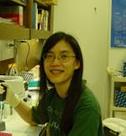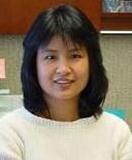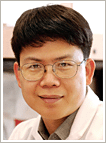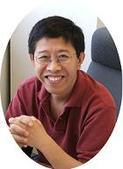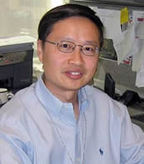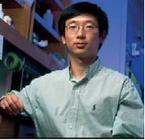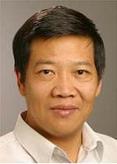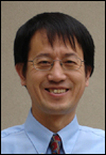Sentry Page Protection
Please Wait...
CBIS Member Profiles
|
Ao, Ping, PhD, Professor
Institute for Systems Biomedicine Shanghai Jiaotong University eMail: [email protected] Business Phone: 021-34207042 Web Site: http://med-x.sjtu.edu.cn/News_Xiangxi.asp?Kind=5&ID=179 CBI Society Role: CBIS Member |
Biography
Prof. Ping Ao graduated in physics from Beijing University in 1983. He then went to USA via TD Lee's CUSPEA program and obtained his PhD supervised by Prof. A.J. Leggett (Noble laureate in physics, 2003) in 1990 in physics at University of Illinois at Urbana-Champaign. He did his postdoc under Prof. D.J. Thouless (Wolf prize winner) at University of Washington, from late 1990 to early 1994. Since 2008, Prof. Ping Ao has been working in Shanghai Center for Systems Biomedicine at Shanghai Jiao Tong University in four main directions: evolution; stochastic dynamics; kinetic behavior of global metabolic networks; endogenous cancer network for genesis and progression. Currently he is the PI of China 973 on obesity, participates in another 973 cancer project, and is a ChangJiang chair professor.
Prof. Ping Ao graduated in physics from Beijing University in 1983. He then went to USA via TD Lee's CUSPEA program and obtained his PhD supervised by Prof. A.J. Leggett (Noble laureate in physics, 2003) in 1990 in physics at University of Illinois at Urbana-Champaign. He did his postdoc under Prof. D.J. Thouless (Wolf prize winner) at University of Washington, from late 1990 to early 1994. Since 2008, Prof. Ping Ao has been working in Shanghai Center for Systems Biomedicine at Shanghai Jiao Tong University in four main directions: evolution; stochastic dynamics; kinetic behavior of global metabolic networks; endogenous cancer network for genesis and progression. Currently he is the PI of China 973 on obesity, participates in another 973 cancer project, and is a ChangJiang chair professor.
|
Bai, Wenlong, Professor,Ph.D.
Dept. Pathology and Cell Biology USF College of Medicine eMail: [email protected] Business Phone: 813-974-0563 CBI Society Role: CBIS Member |
Chan, Francis, Associate Professor
Pathology
University of Massachusetts Medical School
eMail: [email protected]
Business Phone: 1-508-856-1664
CBI Society Role: CBIS Wildcard
Pathology
University of Massachusetts Medical School
eMail: [email protected]
Business Phone: 1-508-856-1664
CBI Society Role: CBIS Wildcard
|
Chang, Chenbei, Ph.D.,Associate Professor
University Of Alabama At Birmingham eMail: [email protected] Business Phone: (205) 975-7229 Web Site: http://main.uab.edu/show.asp?durki=47250 CBI Society Role: CBIS Member |
Biography
Dr. Chenbei Chang received her bachelor degree in Biology major from University of Science and Technology of China. She then conducted her Ph. D. research under the guidance of Dr. Jay Gralla in University of California at Los Angeles, working on mechanisms of eukaryotic transcription regulation. After obtaining her Ph. D. degree in 1994, she went to the Rockefeller University and became a postdoctoral fellow in the laboratory of Dr. Ali H. Brivanlou. She investigated the functions of various signaling pathways during early vertebrate development. In 1998, she was promoted to Research Associate. She came to UAB as an assistant professor in 2001. Her current work focuses on the roles of the TGF-beta and the EGF-receptor pathways in early vertebrate development and in human diseases, such as cancer.
Dr. Chenbei Chang received her bachelor degree in Biology major from University of Science and Technology of China. She then conducted her Ph. D. research under the guidance of Dr. Jay Gralla in University of California at Los Angeles, working on mechanisms of eukaryotic transcription regulation. After obtaining her Ph. D. degree in 1994, she went to the Rockefeller University and became a postdoctoral fellow in the laboratory of Dr. Ali H. Brivanlou. She investigated the functions of various signaling pathways during early vertebrate development. In 1998, she was promoted to Research Associate. She came to UAB as an assistant professor in 2001. Her current work focuses on the roles of the TGF-beta and the EGF-receptor pathways in early vertebrate development and in human diseases, such as cancer.
|
Chen, Ping, Ph.D.,Associate Professor
Department of Cell Biology Emory University School of Medicine eMail: [email protected] Business Phone: 404 727-1808 Web Site: http://cellbio.emory.edu/faculty_detail.cfm?id=12027 CBI Society Role: CBIS Member |
Biography
Our research is focused on two tightly coupled processes involved in the development of the mammalian auditory organ, the organ of Corti. The first emphasis is to study the molecular mechanisms regulating cellular differentiation during the development of the organ of Corti. In particular, we are interested at how individual cells in the cochlea are singled out to become the precursors of the sensory epithelium, and how the precursor cells subsequently know either to terminally differentiate into sensory hair cells or supporting cells. In addition, we examine the cellular and molecular mechanisms that establish the relative position and orientation of sensory hair cells and supporting cells in the organ of Corti during terminal differentiation to shape the unique features of the mammalian auditory organ.
Our research is focused on two tightly coupled processes involved in the development of the mammalian auditory organ, the organ of Corti. The first emphasis is to study the molecular mechanisms regulating cellular differentiation during the development of the organ of Corti. In particular, we are interested at how individual cells in the cochlea are singled out to become the precursors of the sensory epithelium, and how the precursor cells subsequently know either to terminally differentiate into sensory hair cells or supporting cells. In addition, we examine the cellular and molecular mechanisms that establish the relative position and orientation of sensory hair cells and supporting cells in the organ of Corti during terminal differentiation to shape the unique features of the mammalian auditory organ.
|
Chen, Xiaojiang, Ph.D., Professor
Department of Biological Sciences University Of Southern California eMail: [email protected] Phone: 213-740-5487 Web Site: http://college.usc.edu/bisc/people/faculty_display.cfm?Person_ID=1003163 CBI Society Role: CBIS Member |
Biography
Education: BS Biology - Shihezi University, China PhD 1992 Molecular Biology & Biochemistry - University of California, Davis Postdoctoral Research Fellowship: 1994 - 1999 Harvard University, Cambridge, Massachusettes Started at USC: 2004 Research Topics: Cancer, Virology, Immune defense, DNA/RNA enzymes, Protein Motors, Structural Biology
Education: BS Biology - Shihezi University, China PhD 1992 Molecular Biology & Biochemistry - University of California, Davis Postdoctoral Research Fellowship: 1994 - 1999 Harvard University, Cambridge, Massachusettes Started at USC: 2004 Research Topics: Cancer, Virology, Immune defense, DNA/RNA enzymes, Protein Motors, Structural Biology
|
Chen, Zhijian, Ph.D., Professor
University of Texas Southwestern Medical Center at Dallas CeMail: [email protected] Business Phone: 214-648-1145 Web Site: http://www.utsouthwestern.edu/labs/chen-james/ CBI Society Role: CBIS Member |
Biography
1991 SUNY-Buffalo Ph.D. Biochemistry 1991 - 1992 Salk Institute Anna Fuller Fellowship HHMI INVESTIGATOR 2005. Present University of Texas Southwestern Medical Center at Dallas Norman Hackerman Award in Chemical Research, Welch Foundation
1991 SUNY-Buffalo Ph.D. Biochemistry 1991 - 1992 Salk Institute Anna Fuller Fellowship HHMI INVESTIGATOR 2005. Present University of Texas Southwestern Medical Center at Dallas Norman Hackerman Award in Chemical Research, Welch Foundation
Chen, Edward, Assistant Professor
Okazaki Institute for Integrative Bioscience
eMail: [email protected]
CBI Society Role: CBIS Member
Okazaki Institute for Integrative Bioscience
eMail: [email protected]
CBI Society Role: CBIS Member
Chen, Yuqing, Professor
Internal Medicine
UNIVERSITY OF MICHIGAN
eMail: [email protected]
Business Phone: 734-763-7838
CBI Society Role: CBIS Member
Internal Medicine
UNIVERSITY OF MICHIGAN
eMail: [email protected]
Business Phone: 734-763-7838
CBI Society Role: CBIS Member
Chen, Changzheng, Assistant Professor
Medicine, Microbiology and Immunology
Stanford University School of Medicine
eMail: [email protected]
CBI Society Role: CBIS Member
Medicine, Microbiology and Immunology
Stanford University School of Medicine
eMail: [email protected]
CBI Society Role: CBIS Member
Chen, Junjie, Professor
Experimental Radiation Oncology
The University of Texas MD Anderson Cancer Center
eMail: [email protected]
Business Phone: 713-792-4863
CBI Society Role: CBIS Wildcard
Experimental Radiation Oncology
The University of Texas MD Anderson Cancer Center
eMail: [email protected]
Business Phone: 713-792-4863
CBI Society Role: CBIS Wildcard
Chen, Ling-ling, Principal Investigator
Institute of Biochemistry and Cell Biology
Shanghai Institutes for Biological Sciences, Chinese Academy Sciences
eMail: [email protected]
CBI Society Role: CBIS Wildcard
Institute of Biochemistry and Cell Biology
Shanghai Institutes for Biological Sciences, Chinese Academy Sciences
eMail: [email protected]
CBI Society Role: CBIS Wildcard
Chen, Guoqiang, Professor
Shanghai Jiaotong University
School of Medicine
eMail: [email protected]
CBI Society Role: CBIS Member
Shanghai Jiaotong University
School of Medicine
eMail: [email protected]
CBI Society Role: CBIS Member
Chen, Xin, Assistant Professor
Department of Biology
Johns Hopkins University
eMail: [email protected]
CBI Society Role: CBIS Wildcard
Department of Biology
Johns Hopkins University
eMail: [email protected]
CBI Society Role: CBIS Wildcard
Chen, Yabing, Associate Professor
Molecular and Cellular Pathology
University of Alabama
eMail: [email protected]
CBI Society Role: CBIS Member
Molecular and Cellular Pathology
University of Alabama
eMail: [email protected]
CBI Society Role: CBIS Member
|
Cheng, Genhong, Ph.D., Professor
Department Of Microbiology, Immunology And Molecular Genetics UCLA eMail: [email protected] Phone: (310) 825-8896 Web Site: http://www.mimg.ucla.edu/faculty/cheng/genhong.html CBI Society Role: CBIS Member |
Biography
Dr. Genhong Chengs laboratory studies molecular events involved in host defense against pathogen infections. Cheng and his colleagues have recently identified several gene programs specific for antiviral or antibacterial responses. In some cases, the researchers found that host responses to bacterial infection and viral infection may even be opposite. For example, type I interferon, an essential antiviral cytokine, might play a harmful role in host defense against certain bacterial infection. Chengs laboratory also is interested in understanding the mechanisms of chemoresistance and developing novel strategies to improve cancer treatment. They have found that many chemotherapy agents commonly used clinically that are supposed to kill tumor cells can actually activate alternative cell survival pathways to protect tumor cells. This phenomenon may represent a potential mechanism of chemoresistance. Furthermore, Cheng and his colleagues found that blocking the NF- B-dependent up-regulation of Bcl-x and Bfl-1 genes can greatly reduce chemoresistance and sensitize chemotherapy-mediated apoptosis. Chengs laboratory is currently evaluating the possibility of using the combination of NF- B inhibitors and chemotherapy agents for cancer therapy.
Dr. Genhong Chengs laboratory studies molecular events involved in host defense against pathogen infections. Cheng and his colleagues have recently identified several gene programs specific for antiviral or antibacterial responses. In some cases, the researchers found that host responses to bacterial infection and viral infection may even be opposite. For example, type I interferon, an essential antiviral cytokine, might play a harmful role in host defense against certain bacterial infection. Chengs laboratory also is interested in understanding the mechanisms of chemoresistance and developing novel strategies to improve cancer treatment. They have found that many chemotherapy agents commonly used clinically that are supposed to kill tumor cells can actually activate alternative cell survival pathways to protect tumor cells. This phenomenon may represent a potential mechanism of chemoresistance. Furthermore, Cheng and his colleagues found that blocking the NF- B-dependent up-regulation of Bcl-x and Bfl-1 genes can greatly reduce chemoresistance and sensitize chemotherapy-mediated apoptosis. Chengs laboratory is currently evaluating the possibility of using the combination of NF- B inhibitors and chemotherapy agents for cancer therapy.
|
Cheng, Linzhao, Ph.D., Professor
Medicine and Institute for Cell Engineering JOHNS HOPKINS UNIVERSITY eMail: [email protected] Business Phone: (410) 614-6958 Web Site: http://www.stemcelllab.org/people/index.html CBI Society Role: CBIS Member |
Biography
Dr. Linzhao Cheng is a Professor in Johns Hopkins University School of Medicine (JHUSOM). He is also a member of the Stem Cell Program, and a faculty member of the Graduate Training Programs in Cellular and Molecular Medicine, Human Genetics and Molecular Biology, and Immunology. After receiving a PhD degree in Molecular Biology and Genetics from JHUSOM in 1991, Dr. Cheng has been working on stem cell research in NIH, the biotech industry and academia. He has extensive experience in several types of stem cells including human hematopoietic stem cells (HSC), mesenchymal stem cells/marrow stromal cells (MSC), embryonic stem (ES) cells and induced pluripotent stem (iPS) cells. His current research focuses on stem cell biology and engineering for human blood disease modeling and treatment such as cell and gene therapy.
Dr. Linzhao Cheng is a Professor in Johns Hopkins University School of Medicine (JHUSOM). He is also a member of the Stem Cell Program, and a faculty member of the Graduate Training Programs in Cellular and Molecular Medicine, Human Genetics and Molecular Biology, and Immunology. After receiving a PhD degree in Molecular Biology and Genetics from JHUSOM in 1991, Dr. Cheng has been working on stem cell research in NIH, the biotech industry and academia. He has extensive experience in several types of stem cells including human hematopoietic stem cells (HSC), mesenchymal stem cells/marrow stromal cells (MSC), embryonic stem (ES) cells and induced pluripotent stem (iPS) cells. His current research focuses on stem cell biology and engineering for human blood disease modeling and treatment such as cell and gene therapy.
Cheng, Shiyuan, PhD, Professor
Feinberg School of Medicine
NORTHWESTERN UNIVERSITY
eMail: [email protected]
Business Phone: 3125033043
CBI Society Role: CBIS Member
Feinberg School of Medicine
NORTHWESTERN UNIVERSITY
eMail: [email protected]
Business Phone: 3125033043
CBI Society Role: CBIS Member
Cui, Rutao, Associate professor
Dermatology/Biochemistry
Boston University
eMail: [email protected]
Business Phone: 6176385522
CBI Society Role: CBIS Wildcard
Dermatology/Biochemistry
Boston University
eMail: [email protected]
Business Phone: 6176385522
CBI Society Role: CBIS Wildcard
|
Deng, Xingwang, PhD,
The Daniel C. Eaton Professor of Plant Biology Molecular, Cellular and Developmental Biology YALE UNIVERSITY eMail: [email protected] Business Phone: (203) 432-8908 / 8909 Web Site: http://www.biology.yale.edu/facultystaff/deng.html CBI Society Role: CBIS Member |
Biography
Dr.Deng received his Ph.D. in plant biology from the University of California at Berkeley. His research centers on plant genetics and agro-biotechnology. He is an author of over 100 research papers and Director of Peking-Yale Joint Center for Plant Molecular Genetics and Agro-biotechnology. Professor Deng is a recipient of the Presidential Faculty Fellow Award and the Kumho Science International Award. He also has served as advisory board member for several professional organizations and associate editor for multiple scientific journals.
Deng, Hongkui, Professor
College of Life Sciences
PEKING UNIVERSITY
eMail: [email protected]
CBI Society Role: CBIS Member
College of Life Sciences
PEKING UNIVERSITY
eMail: [email protected]
CBI Society Role: CBIS Member
|
Ding, Sheng, Ph.D., Professor
Pharmaceutical Chemistry Gladstone/UCSF eMail: [email protected] Business Phone: 415-734-2717 CBI Society Role: CBIS Member |
Biography
Dr.Sheng Ding did his undergraduate at California Institute of Technology with Drs. Grubbs, Rees, Goddard, Myers and Chan. His work with Dr. Grubbs (2005 Nobel Laureate in Chemistry) resulted in the "the second generation of Grubbs Catalyst", and work with Dr. Rees resulted in a 0.7 angstrom DNA structure. After he graduated from Caltech in 1999, he joined Dr. Peter Schultz lab at the Scripps Research Institute to conduct his Ph.D. studies, which opened up new avenues for developing future regenerative medicine. He then started his independent career as an Assistant Professor in the Chemistry Department at Scripps by the end of 2003. Since early 2007, Ding has been an Associate Professor at Scripps.
Dr.Sheng Ding did his undergraduate at California Institute of Technology with Drs. Grubbs, Rees, Goddard, Myers and Chan. His work with Dr. Grubbs (2005 Nobel Laureate in Chemistry) resulted in the "the second generation of Grubbs Catalyst", and work with Dr. Rees resulted in a 0.7 angstrom DNA structure. After he graduated from Caltech in 1999, he joined Dr. Peter Schultz lab at the Scripps Research Institute to conduct his Ph.D. studies, which opened up new avenues for developing future regenerative medicine. He then started his independent career as an Assistant Professor in the Chemistry Department at Scripps by the end of 2003. Since early 2007, Ding has been an Associate Professor at Scripps.
|
Ding, Shouwei, Ph.D., Professor
Department of Plant Pathology University of California eMail: [email protected] Business Phone: (951) 827-2341 Web Site: http://www.cepceb.ucr.edu/members/ding.htm CBI Society Role: CBIS Member |
Biography
I received my BSc and MSc from China and PhD from the Australian National University in 1990. I went to the National University of Singapore as an Assistant Professor in July 1996 after postdoctoral studies in the Agricultural Canada Research Station in Vancouver and the Waite Agricultural Research Institute of the University of Adelaide in Australia. I came to UCR in December 2000. An initial goal of the research in my lab was to determine the function of an overlapping gene (2b) encoded by cucumber mosaic virus (CMV), discovered during my postdoctoral study in Dr. Bob Symonss lab in Australia. This effort resulted in the identification of the CMV 2b protein in 1998 as one of the first two viral suppressors of gene silencing, in collaboration with Dr. David Baulcombes group in the UK. Our subsequent research has focused on the mechanism of gene silencing suppression by viral proteins and their interactions with other host defense pathways. A new project recently developed in UCR is to determine if gene silencing plays a role in the animal defense against viruses. I was elected as a full member of the Asia-Pacific International Molecular Biology Network in 2000 and presented an invited State-of-the-Art Lecture on viral suppression of gene silencing at the American Society for Virology 2001 Annual Meeting in Madison.
I received my BSc and MSc from China and PhD from the Australian National University in 1990. I went to the National University of Singapore as an Assistant Professor in July 1996 after postdoctoral studies in the Agricultural Canada Research Station in Vancouver and the Waite Agricultural Research Institute of the University of Adelaide in Australia. I came to UCR in December 2000. An initial goal of the research in my lab was to determine the function of an overlapping gene (2b) encoded by cucumber mosaic virus (CMV), discovered during my postdoctoral study in Dr. Bob Symonss lab in Australia. This effort resulted in the identification of the CMV 2b protein in 1998 as one of the first two viral suppressors of gene silencing, in collaboration with Dr. David Baulcombes group in the UK. Our subsequent research has focused on the mechanism of gene silencing suppression by viral proteins and their interactions with other host defense pathways. A new project recently developed in UCR is to determine if gene silencing plays a role in the animal defense against viruses. I was elected as a full member of the Asia-Pacific International Molecular Biology Network in 2000 and presented an invited State-of-the-Art Lecture on viral suppression of gene silencing at the American Society for Virology 2001 Annual Meeting in Madison.
Ding, Xinxin , Chief
Laboratory of Molecular Toxicology Division of Environmental Health Sciences
Wadsworth Center, Department of Health EmpireNew York State
eMail: [email protected]
CBI Society Role: CBIS Member
Laboratory of Molecular Toxicology Division of Environmental Health Sciences
Wadsworth Center, Department of Health EmpireNew York State
eMail: [email protected]
CBI Society Role: CBIS Member
|
Dong, Jintang, Ph.D.,
Professor and Vice Chair for Winship Cancer Institute Emory University School Of Medicine eMail: [email protected] Business Phone: 404-712-2568 Web Site:http://www.biomed.emory.edu/PROGRAM_SITES/GMB/faculty.html CBI Society Role: CBIS Member |
Biography
The development and progression of cancer are driven by a series of mutations in a number of genes. The research in our laboratory involves both identifying novel cancer genes and studying how abnormalities of these genes cause cancer. For gene identification, we apply genetic and functional approaches to discover tumor suppressor genes located in chromosomal regions frequently deleted in human cancer. We have identified KLF5 from 13q21, FOXO1A from 13q14, ATBF1 from 16q22, and U50 from 6q15, but more genes remain to be discovered. We also identified WWP1 as an oncogene from 8q21, a chromosomal region often amplified in human cancer. The functions of these genes are being examined by tissue specific knockout or overexpression in mouse models and subsequent phenotypic and molecular analyses. Another important area of research is to dissect the molecular pathways involving these genes, especially KLF5 and ATBF1, by using biochemical approaches. We study how the signaling pathways are different between normal and cancer cells, and determine whether we can kill cancer cells by modulating the pathways. Such knowledge is useful for developing biomarkers in cancer detection and for therapeutic intervention in cancer treatment.
The development and progression of cancer are driven by a series of mutations in a number of genes. The research in our laboratory involves both identifying novel cancer genes and studying how abnormalities of these genes cause cancer. For gene identification, we apply genetic and functional approaches to discover tumor suppressor genes located in chromosomal regions frequently deleted in human cancer. We have identified KLF5 from 13q21, FOXO1A from 13q14, ATBF1 from 16q22, and U50 from 6q15, but more genes remain to be discovered. We also identified WWP1 as an oncogene from 8q21, a chromosomal region often amplified in human cancer. The functions of these genes are being examined by tissue specific knockout or overexpression in mouse models and subsequent phenotypic and molecular analyses. Another important area of research is to dissect the molecular pathways involving these genes, especially KLF5 and ATBF1, by using biochemical approaches. We study how the signaling pathways are different between normal and cancer cells, and determine whether we can kill cancer cells by modulating the pathways. Such knowledge is useful for developing biomarkers in cancer detection and for therapeutic intervention in cancer treatment.
Dong, Xinnian, Professor
BiologyDuke University
eMail: [email protected]
Business Phone: 9196138176
Web Site: http://biology.duke.edu/donglab/
CBI Society Role: CBIS Member
BiologyDuke University
eMail: [email protected]
Business Phone: 9196138176
Web Site: http://biology.duke.edu/donglab/
CBI Society Role: CBIS Member
Dong, Chen, Professor
Immunology
MD Anderson Cancer Center
eMail: [email protected]
CBI Society Role: CBIS Wildcard
Immunology
MD Anderson Cancer Center
eMail: [email protected]
CBI Society Role: CBIS Wildcard
Dou, Yali, Associate Professor
Pathology, Biological Chemistry
University of Michigan
eMail: [email protected]
CBI Society Role: CBIS Wildcard
Pathology, Biological Chemistry
University of Michigan
eMail: [email protected]
CBI Society Role: CBIS Wildcard

